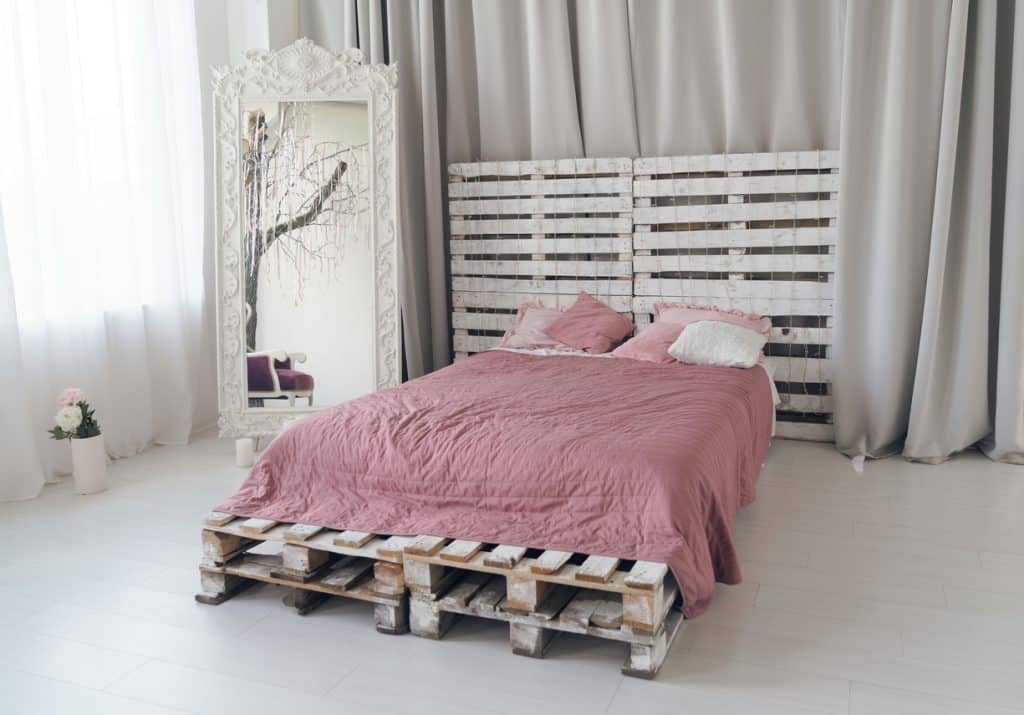Most people think that sleeping on a raised bed is simply more comfortable. But there are other reasons why you might want to consider raising your bed up off the ground. In this post, we’ll explore some of those reasons.
We sleep on raised beds in order to help keep warm, allow air to circulate around the bed, and avoid any nasty additions to the bed such as mice and bugs. Read on for more information.
When did we start sleeping on raised beds?
Raised beds have been around for much longer than you might imagine. In the first ever known town 10,000 years ago (Catalhoyuk in Turkey) people used raised platforms to sleep on.
Similarly, 6,000 years ago the settlement of Skara Brae in Scotland UK used stones to create raised beds to lie on to sleep.

Why do we sleep on raised beds?
The reasons why we sleep on raised beds are mainly to do with hygiene in earlier periods, and raised beds have now become traditional in the West.
Easier to get in and out of
One of the main reasons people sleep on raised beds is because it is much easier to get in and out of them. This can be important for elderly people or those with back problems who might struggle to get in and out of a bed that is close to the ground.
Easier to change the linen
In addition, raised beds are much easier to change the linen on. This means that you can keep your bedding clean and fresh much more easily.
Avoid dust and dirt
Another reason to sleep on a raised bed is to avoid getting dust and dirt on your bedding. If your bed is close to the ground, it is much more likely that dust and dirt will be able to get onto your bedding. This can be especially problematic if you have allergies.
Avoid pests such as rats and mice
Rats and mice are attracted to the warmth of a bed, and if your bed is on the ground they can easily climb into it.
If you have a raised bed, it is much more difficult for rats and mice to climb into it. This is because they are not as good climbers as squirrels or other animals that can easily jump up to a higher level. Raised beds also provide a barrier between the rodents and your bedding material, which makes it more difficult for them to build nests and contaminate your bed with their droppings.
Bed Bugs
Bed bugs are another type of vermin that can be found in beds. They are small, brown insects that feed on human blood. Bed bugs can bite humans and cause itching and redness.
If you have a raised bed, it is more difficult for bed bugs to climb into it. This is because they are not very good climbers. Raised beds also provide a barrier between the bed bugs and your bedding material, which makes it more difficult for them to get to you.
Insects
If you want to keep your bed free of insects such as spiders, having a raised bed is a good idea. Bugs, ants, dust mites, and other pests are less likely to get into your bed if it’s elevated off the ground.
Read also: How to keep spiders away while sleeping.
Read also: How to keep ants away from your bed.
Temperature
If you live in a warm climate, sleeping on a raised bed can help keep you cool at night. The air circulates better around the bed and this can help to evaporate any sweat that you produce during the night.
In a cold climate, sleeping on a raised bed can help to keep you warmer. Raising your bed off the ground helps to insulate it from the cold floor and this can make a big difference to your comfort during the night.
Read also: How to keep futon mattress from sliding
Air circulation
One of the main reasons why we sleep on raised beds is to allow air to circulate around the bed. This is important for two reasons.
The first reason is that it helps to keep the bed cooler in a warm climate. The second reason is that it helps to prevent moisture building up under the bed, which can lead to mold and mildew.
If you have a raised bed, it’s important to make sure that the air can circulate freely around it. This means not putting anything underneath the bed that would block the airflow. For example, if you have a raised bed with storage underneath, make sure that the storage is well ventilated so that air can circulate freely.
Read also: Slatted bed base vs plywood – our guide on which you should choose.
Can sleeping on the floor make you sick?
Sleeping on the floor will generally not have any negative impact on you in the short term, but there are some people who should avoid sleeping on the floor.
Allergies
If you suffer from allergies then you do not want to sleep on the floor, as you may be more exposed to triggers than you would be on a raised bed. For example, dust mites, dirt and mold are all likely to be more prevalent on the floor.
Mold and mildew
If you are sensitive to mold and mildew then sleeping on the floor may not be a good idea as mildew will be more likely to accumulate because there is no air flow under your bed.
Cold
If you suffer any conditions which are worsened by the cold then you should not sleep on the floor as you will be more exposed to the cold. This includes conditions such as arthritis, joint pain and some forms of muscle pain.
Types of raised beds
People have been sleeping on raised beds for centuries for a variety of reasons. Today, there are many benefits to sleeping on a raised bed, including improved air circulation, better back support, and less pain in the morning.
Platform bed
There are a few different types of raised beds, but the most popular is the platform bed. A platform bed is a wooden frame with a mattress on top. The frame can be raised up to several inches off the ground, which allows for better air circulation and helps keep you cool during summer nights.
Hammock
Another type of raised bed is the hammock bed. Hammock beds suspend you in the air, which takes the pressure off your spine and prevents you from tossing and turning during the night. This type of bed is great for people who suffer from back pain, as it provides orthopedic support.
Charpai
A charpai is a traditional Indian bed which is made from a frame of wood or metal, with woven fabric stretched across it. Charpais are raised off the ground, which helps to keep you cool in the summer and can also help to prevent pests from getting into your bed.
You can read more about the benefits of sleeping on a charpai here.
Adjustable Bed
The final type of raised bed is the adjustable bed. Adjustable beds allow you to customize the height of your bed and find the perfect position for your body. This is especially beneficial for people with chronic pain or other health conditions.
Regardless of which type of raised bed you choose, you’ll enjoy all of the benefits that come with sleeping on one. So ditch your old mattress and upgrade to a raised bed today!
Is it better to sleep on a raised bed?
There are many benefits to sleeping on a raised bed, but ultimately it is a personal choice. Some people find sleeping on the floor more comfortable than sleeping in a bed, while others prefer the traditional way of sleeping on a raised bed. Whatever your preference, there is no right or wrong answer. It is simply a matter of personal preference.
In what countries do people sleep on the floor?
The most famous country where they sleep on the floor is Japan.
Other cultures also sleep on the floor. For example, in Kazakhstan some groups use sleeping bags on the floor because traditionally the nomadic lifestyle involved carrying sleeping equipment wherever they went.
Why don’t Japanese people use beds?
In Japan, it is considered healthy to sleep on the floor. Instead, a Tatami mat of rice straw is used on the floor, with a futon bed placed over the top. This allows Japanese people to use their space in a different way during the day, and only as a bedroom when it is needed.
Culture
Culture and tradition also play a role in this decision. In the past, Japanese homes were small and families often slept together in one room. This meant that there wasn’t always enough space for a bed.
Today, many people in Japan still prefer to sleep on the floor even though they have more space. They believe that sleeping on a raised bed is bad for your health. Some even say that it can lead to back problems and poor circulation.
Space saving
Another reason that people in Japan sleep on the floor is because it saves space. Tatami mats are much thinner than a mattress, so they take up less room. This is important in Japan where space is often at a premium.
There are also futon beds that can be folded up and stored away during the day. This means that you don’t have to have a separate room for your bedroom. You can use the space for other things during the day, and then turn it into a bedroom at night.
Cooler temperature
Sleeping on the floor is also said to be cooler in the summer. This is because there is more air circulation around your body. This can be a relief in the hot and humid summers of Japan.
Read also: Can you sleep on a mattress topper on the floor?
Conclusion: Why do we sleep on raised beds?
There are many reasons why people choose to sleep on a raised bed. Some people find it more comfortable than sleeping on the floor, while others prefer the traditional way of sleeping on a raised bed. Raised beds can also help to prevent back pain and improve air circulation. Additionally, adjustable beds allow you to customize the height of your bed for optimal comfort.
